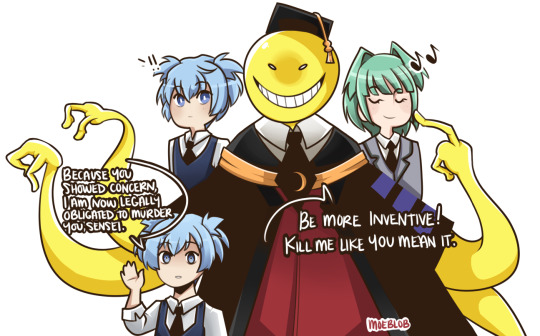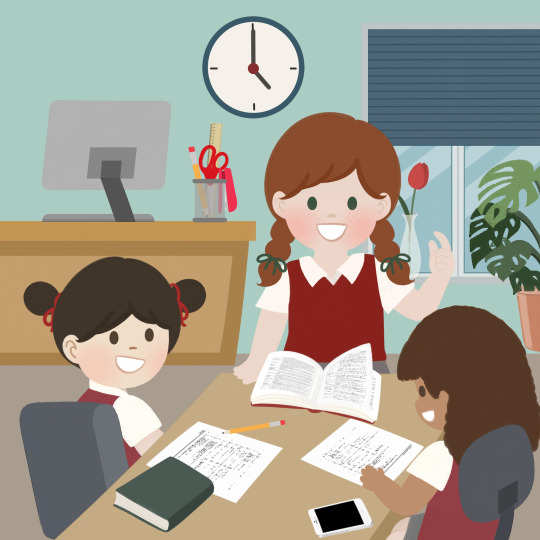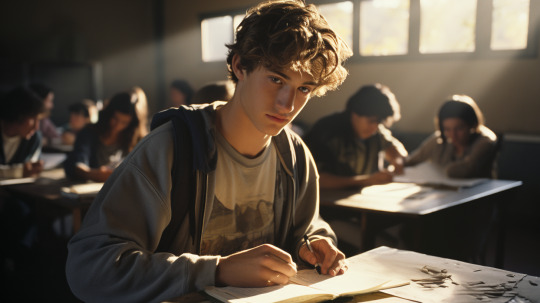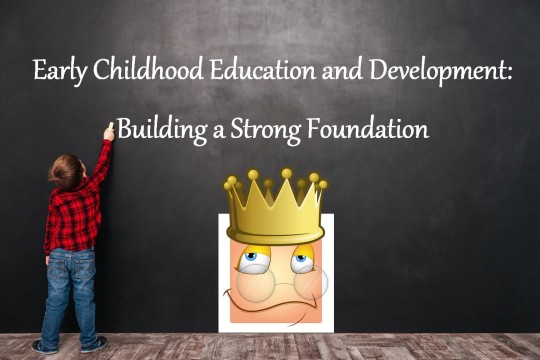#inclusive classroom
Text
Embracing the New Academic Year: Key Considerations for Teachers in 2023 and Beyond
An article by Richard James Rogers (Award-Winning Author of The Quick Guide to Classroom Management and The Power of Praise: Empowering Students Through Positive Feedback).
Illustrated by Pop Sutthiya Lertyongphati.
Hello, dedicated educators and champions of knowledge! As we gear up for another exciting academic year, it’s time to reflect on the lessons learned, the challenges overcome, and…

View On WordPress
#behavior management#blended teaching#classroom#classroom calming corner#classroom management#diverse classroom#EAL Teaching#education#ELD Teaching#english teaching#ESL Teaching#flipped classroom#Google Classroom#happiness teacher#hybrid teaching#inclusive classroom#international teaching#Newly Qualified Teacher#online teaching#parent-teacher#pedagogy#planning#post-COVID teaching#Post-pandemic teaching#Practical Teaching Tips#remote teaching#richard james rogers#Richard James Rogers award-winning author#Richard James Rogers bestselling author#school
1 note
·
View note
Text

Assassination Classroom (episode 1)
For those that don't know: I asked for random episodes from random anime to watch and then I'd draw a doodle from it. Thank you.
#assassination classroom#koro sensei#kaede kayano#nagisa shiota#tysm for the rec that was..... interesting#i thought kaede was cute hence the inclusion and she also was shown a fair amount compared to others#that were not nagisa so o7#i will probably do an episode and art a day and i saved all the replies and asks so far to a canvas
620 notes
·
View notes
Text
people who are D/deaf or hard of hearing, if you're willing to share: what's worked for you in academic contexts? what hasn't? what could teachers do to make school better for you?
#D/deaf#deaf#hard of hearing#working on a project for inclusive classrooms and would love to have some first-hand accounts if yall are willing to share
15 notes
·
View notes
Text
There are days when I wish my mom was still here so I could ask her about the reasons my school teachers often wanted her to come to school to discuss how I behaved in class and how I interacted with the other kids. I was a rude kid, talked a lot (and loud - which is something I still do) and over others, I was a bit of an outsider. I remember that instead of doing class activities, I'd rather be on my own and write on my diary how everyone sucked and how come I was so stupid and didn't know how to interact with people. So I am really curious to know what did they have to say about this behavior. Why was I like this? And why I am sorta still like this now and no one thought about helping me when I needed it the most (during my formative years). I think about this a lot because I strive to understand the reason I am the way I am. Because I am the result of past behaviors and in order to change the future, I need to understand the past. Those behaviors shaped me, my life, my personality. And I need some clarity. I am very introspective and this is one of my core strengths, I think. So I'll try to find the answer inside of me.
#Tweety.txt#personal#I started thinking about this bc I am studying inclusiveness in the classroom and I remembered about my own not so very inclusive experienc
4 notes
·
View notes
Text
the best thing about an education program is that every assignment I turn in is like a little personal diary <3 I'm going to tell you exactly how this idea makes me feel and talk about my personal experiences and maybe even sprinkle in a little funny anecdote or side comment <3
#basically just turned in three pages talking about what inclusive classrooms mean to me... enjoy my ramblings john <3#personal#school stuff
2 notes
·
View notes
Text
being in school while working in the mental health/education field is like:
*emails self work-related scholarly literature to see if you can access the full text through your institution later*
#i try to keep firm work-life boundaries but sometimes it can’t be helped lol#grad school#mental health#we gonna LEARN tonight about how to practically implement inclusive practices for children with ASD in a classroom setting ladies
3 notes
·
View notes
Text
sorry but it drives me insane that a bunch of french men with the egos bigger than their tower and a whole lotta french pedophiles got together with the fuckin c i a and ivly league schools and. now. today. this. THIS is the state of the "liberal leftist" west. and you got "commies" who pretend to eat the manifesto for breakfast but who think "swerfs" exist. its like a really, really, really, Really bad joke which doesnt stop and which is real
#god has a sense of humor it is obvious#....#being an anthropology major. and not being able to stand all this. is a fucking nightmare#the fact that i feel a need to conciousness raise abt this class in any form of sort way is. a nightmare. like i do it and i do not like#that i feel i have to do this. but someone needs to fucking say something#you know. my professor held this viewpoint that there is a difference between the classroom and outside. academia and the non academic#but. there isnt. there fucking isnt and were quite literally seeing the very real life very scary impacts of it. before our eyes.#so like yea when i know that quite literally no one will say anything substantial against postmodern narratives of feminism in particular#that are taught. and that this WILL be taken as the PROPER feminism even Outside of academia. Yea i have to say something about it#and i have to provide a different viewpoint and actually i have to be like. hey? that sex work thing? a)offensive#b)harmful c) class conciousness who?#...... when it is directly taught that postmodern feminism is the feminism which is the most current. the one which is most inclusive. It#Will Be and it has been understood as the feminism outside the classroom#which sorry. everyone likes to pretend like feminism is this individual thing but I got a real damn problem with the fact#that these narratives are harming. directly. in real life. a whole lot of fucking people which are mainly women#....... if theres one thing that being really damn traumatized but getting out of it taught me. is that individual freedom really doesnt#mean that much...... what haunts me more. frankly. what haunts me so much more than my own trauma#is that its happening to other fucking people. still. .... my freedom brings me little comfort when i know this. at all times.#...... once again i say. who will care if we dont as women for one another. who. w h o. the... the? who knows maybe lets be generous 5% of#men who are genuinely. okay people who see us as full human beings?.... were half the fucking population#..... most obviously we have differences but differences and all it turns out. contrary to the western Youre Born Alone You Die Alone Bro#mentality. we are all very much tied together and quite stuck together and quite dependent on each other in a million damn ways#... and we NEED each other.#.#so. if 3 of the white kids (and noone else LMAO of course its the fucking white kids) now shoot daggers at me when i walk into class. i#dont give a shit. Because so many of the women who are antisex work will not have the opportunity and dont have the opportunity to be in a#western classroom and speak out about these things. they dont. because theyre too busy being half drugged out tryint to cope and survive on#the streets.#but i. technically. got out. and im here. so I have to fucking say something about it.
6 notes
·
View notes
Text
btw... mtel practice test number two done... crushed that bitch! the Comm/Lit one is supposed to be the easiest but still it felt nice to get a 90% gonna take the humanities practice tomorrow but i suddenly feel way better about this
#ive felt so useless since being on medical leave#and like i get that i cant really teach when i cant really walk rn#but being able to feel like im doing something productive with my time is huge#like goddamn im crushing it#tbh the tests dont cost THAT much and if i want to get hired at my dream school maybe i should cast a wider net#and just do my math/science cert as well#i had a math homeroom this year and did i like the material? no. could i teach it in a way that is understood by the children? like yeah#the bar is really on the ground- most of teaching the lower and middle grades is classroom management literacy and comprehension#and since i have had two years workng in SLD and understanding IEPs and 504s i know how to teach the material in a way that would be fine#like i wouldnt WANT to be a math teacher.... but if push comes to shove maybe i should get certified anyway#idk idk rn we are looking for visual arts and middle school social studies and then we will open up the search if there are no openings#...ugh i should also look into a moderate disability license with the way things are going for BPS every classroom is gonna be inclusion#which wouldnt be a problem if they ACTUALLY provided support for the Inclusion and SLD and ELL strands#I DIGRESS#im not fucking teaching ELL though no thank you i had to cover middle school ELL this year a few times and you can just take me out back#and shoot me. im not qualified and i do not want that responsibility thanks
0 notes
Link
Early childhood programs can implement policies and practices of inclusion of all children. Join Cindy and Alison for a discussion about what it means to have an inclusive environment and how we can support that for early learners.
#childcare#children#classroom#daycare#disability#earlychildhood#earlychildhoodeducation#earlylearning#ece#families#inclusion#parenting#parents#specialeducation#teachers
0 notes
Text
Challenges Faced by Teachers in Diverse Classrooms
Diverse classrooms create both opportunities and challenges for teachers. In today's blog post, Kiara Miller from The Speakingnerd describes how educators can successfully deal with the unique issues that diverse classrooms present. Read more, here:
What is the first thing that comes to mind when you hear the word ‘diversity’?
Most people will come up with a variety of answers, which may include race, gender, economic background or even neurodiversity. As educators, we must first be able to recognize diversity when we see it (which isn’t always obvious), and then work to both embrace it and manage the challenges posed by it. Classrooms are…

View On WordPress
#behavior management#behaviour#behaviour management#classroom#classroom management#critical race theory#diverse#diverse classroom#diversity#education#equality#equity#gender#inclusion#inclusive#inclusive classroom#inclusivity#intergender dynamics#international#international schools#international teaching#intervention#kiara miller#neurodiversity#pedagogy#race#richard james rogers#school#students#teachers
1 note
·
View note
Text
Creating an environment conducive to learning is a shared goal among educators, parents, and communities. Airport Innovators Incubator Complex Corporation is vital in supporting this mission by serving as an invaluable education resource in Pennsylvania.
0 notes
Text
Diversity in Education #Edutalkshow
Step into the dynamic world of education as we delve deep into the impact of diversity in the classroom. Join us in this enlightening case study that showcases the incredible benefits and challenges of a diverse learning environment.
Step into the dynamic world of education as we delve deep into the impact of diversity in the classroom. Join us in this enlightening case study that showcases the incredible benefits and challenges of a diverse learning environment. From inclusive teaching strategies to celebrating cultural richness, we dissect the keys to nurturing an inclusive educational space.
📚 Key Takeaways:
Strategies…
View On WordPress
#benefits of diversity in education#challenges of diverse classrooms#classroom case study#cultural richness#diverse classroom#diversity in education#educational inclusivity#embracing diversity#fostering mutual respect#inclusive education#inclusive teaching
0 notes
Text
Embracing Indigenous History and Culture in Education: Going Beyond the Classroom
Shaina Tranquilino
October 2, 2023

As educators, we have a responsibility to provide inclusive and comprehensive education that celebrates diversity and promotes cultural understanding. When it comes to teaching Indigenous students about their history and culture, traditional classroom lessons often fall short of creating a holistic learning experience. In this blog post, we will explore the importance of incorporating land-based learning and connecting with the land as complementary methods to enhance Indigenous education.
1. Acknowledging the Limitations of Classroom Learning:
While classroom discussions, books, and videos can provide valuable insights into Indigenous history and culture, they cannot fully capture the depth of knowledge that is embedded within the land itself. Indigenous communities have rich histories intricately connected to the land which are essential for a comprehensive understanding of their culture. By relying solely on textbooks or lectures, we risk perpetuating stereotypes and missing out on vital aspects of Indigenous heritage.
2. The Significance of Land-Based Learning:
Land-based learning takes education beyond four walls by immersing students in nature and allowing them to engage firsthand with the environment that holds significant cultural meaning. This approach emphasizes an experiential learning process where Indigenous students can connect deeply with their ancestral territories through activities such as storytelling, plant identification, traditional crafts, or teachings from Elders. By fostering direct engagement with the land, students develop a profound sense of pride in their heritage while simultaneously gaining ecological awareness.
3. Visiting Reserves: Bridging Cultural Gaps:
To truly understand the complexities of Indigenous history and culture, it is essential for Indigenous and non-Indigenous students to step outside their comfort zones and visit reserves or Indigenous communities themselves. These visits facilitate meaningful interactions between different cultures while dispelling misconceptions or biases that may exist due to historical narratives or media portrayals. Seeing firsthand how people live, hearing personal stories from community members, participating in ceremonies or celebrations all contribute to building empathy, respect, and a genuine appreciation for Indigenous cultures. By being on the land and away from city life, they will be able to connect to their spirituality, and that is where true healing takes place.
4. Connection to the Land: Strengthening Identity:
For many Indigenous peoples, the land is not just a physical space; it is intricately woven into their identity and spirituality. By fostering a relationship between students and the land through outdoor activities, such as planting gardens or participating in traditional practices like fishing, gathering medicinal plants, sweat lodges, dances, and going to ceremonies, educators can help strengthen Indigenous students' connection to their heritage. This sense of belonging and rootedness empowers them to embrace their cultural identities with pride while enhancing their overall well-being.
5. Collaborating with Elders and Knowledge Keepers:
Incorporating Indigenous knowledge keepers and Elders into the educational process is crucial for authentic learning experiences. Their wisdom provides invaluable insights into traditional practices, customs, languages, storytelling methods, and spiritual beliefs that cannot be learned from textbooks alone. Inviting these respected community members as guest speakers or organizing cultural workshops ensures that students receive firsthand information from those who have lived and experienced Indigenous history and culture.
While classroom education plays an essential role in teaching Indigenous history and culture, it must be supplemented by land-based learning experiences, reserve visits, and active connections with the land itself. These approaches allow Indigenous students to explore their roots authentically while fostering cross-cultural understanding among non-Indigenous students. By embracing these holistic educational practices, we bridge gaps of knowledge, promote empathy and respect, and pave the way towards a more inclusive society where Indigenous voices are truly heard and celebrated.
#Indigenous culture education#indigenous culture#beyond the classroom#indigenous heritage#Cultural appreciation#learn from Indigenous wisdom#Indigenous knowledge matters#teach with respect#diverse histories matter#honouring our ancestors#inclusive education
1 note
·
View note
Text
Effective Strategies for Supporting Neurodiverse Adult Learners: A Conversation with Annette Tofaeono
Unlock the power of inclusive education with effective neurodiversity strategies for educators. Learn how to create an inclusive classroom, implement learning techniques, and communicate effectively.
Working with Neurodiverse Learners – What Are Some Strategies You Can Use? Part 1
Welcome back to our ongoing series on neurodiversity and learning differences. In this third instalment, my colleague and friend Annette and I explore the essential strategies for working with adult students who may have learning differences.
Inclusive Classroom Culture
Annette starts by emphasising the…

View On WordPress
#adult education#Alternative Assessments#Annette Tofaeono#Classroom Culture#Communication Techniques#Dyslexia Resources#Dyslexia-Friendly#Educational Support#Graeme Smith#Inclusive Education#inclusive learning environment#learning differences#neurodiversity#Stress-Free Environment#teaching strategies#thisisgraeme
1 note
·
View note
Text
Early Childhood Education and Development
Early childhood education and development play a pivotal role in shaping the future of individuals and societies. This critical phase of a child’s life, typically spanning from birth to age eight, lays the foundation for cognitive, social, emotional, and physical growth.
In this article, we delve into the significance, key components, and benefits of early childhood education and development,…

View On WordPress
#Child development#Child-Centered Learning#Cognitive Development#Creative Play#Critical Thinking#Developmental Milestones#Early Childhood Assessment#Early Childhood Classroom#Early Childhood Curriculum#Early Childhood Education#Early Childhood Educator#Early Intervention#Early Learning Curriculum#Early Literacy#Emotional Development#Fine Motor#Inclusive Education#Kindergarten Readiness#Language Acquisition#Motor Skills#Numeracy Skills#Parent Involvement#Parent Teacher Communication#Personalități românești#Physical Development#Play-Based Learning#Preschool Learning#Problem-Solving#Sensory Exploration#Skills Gross
0 notes